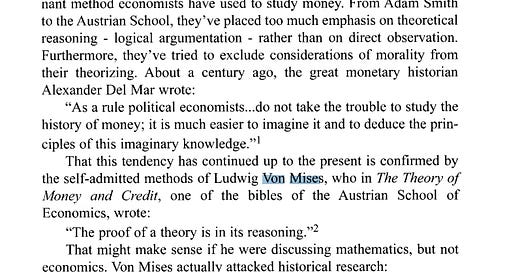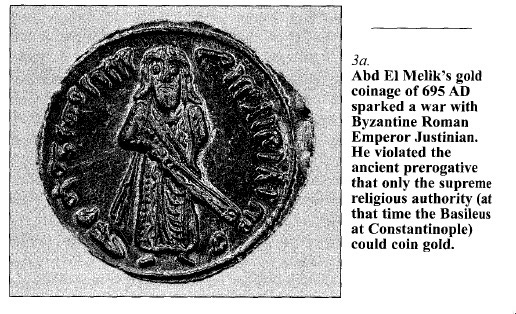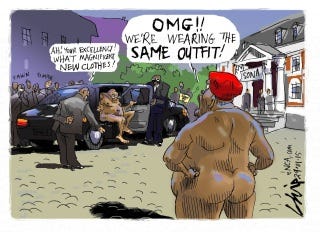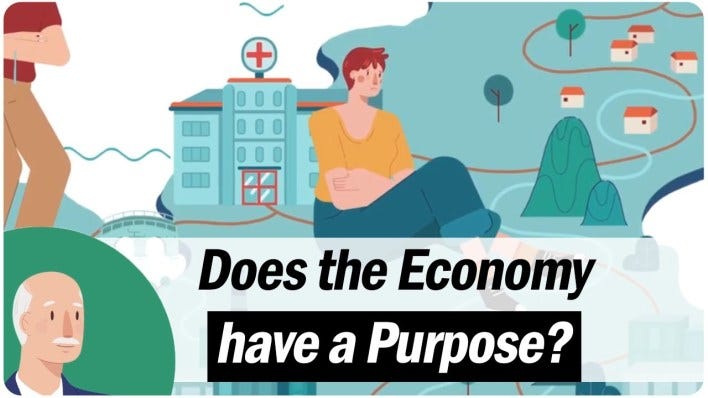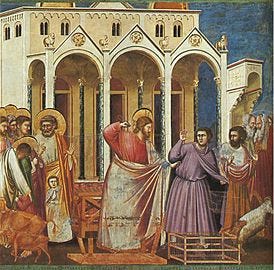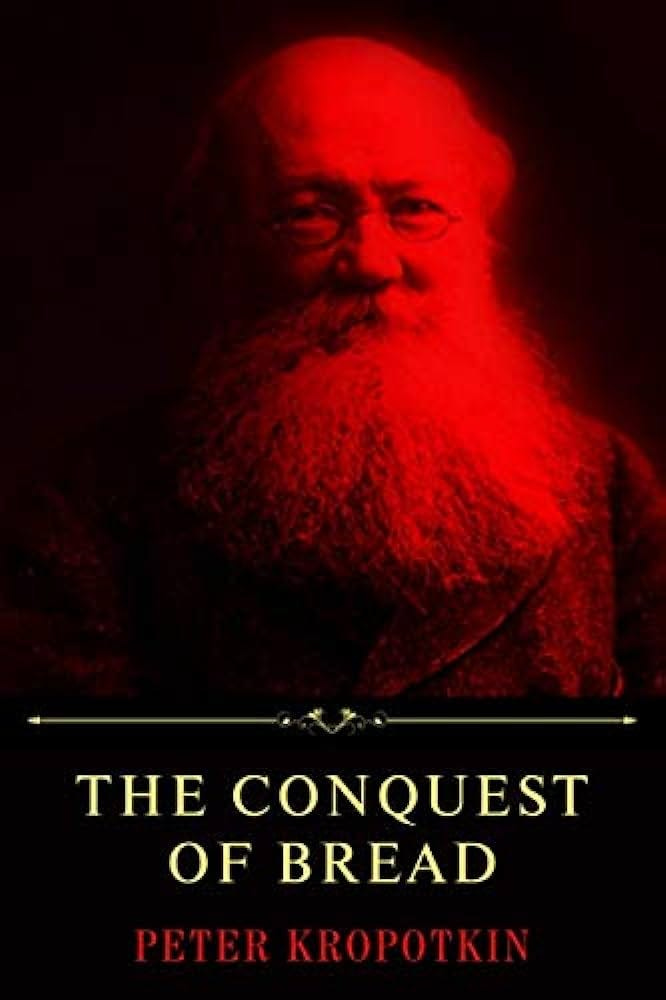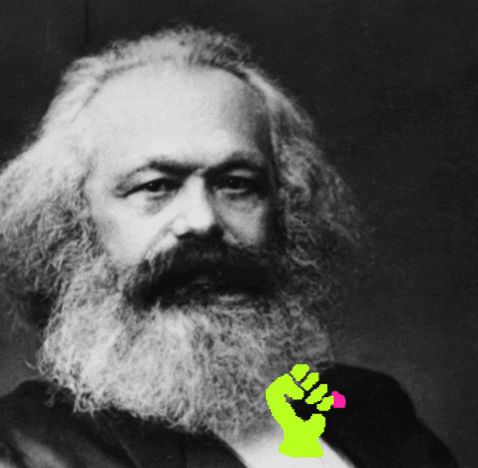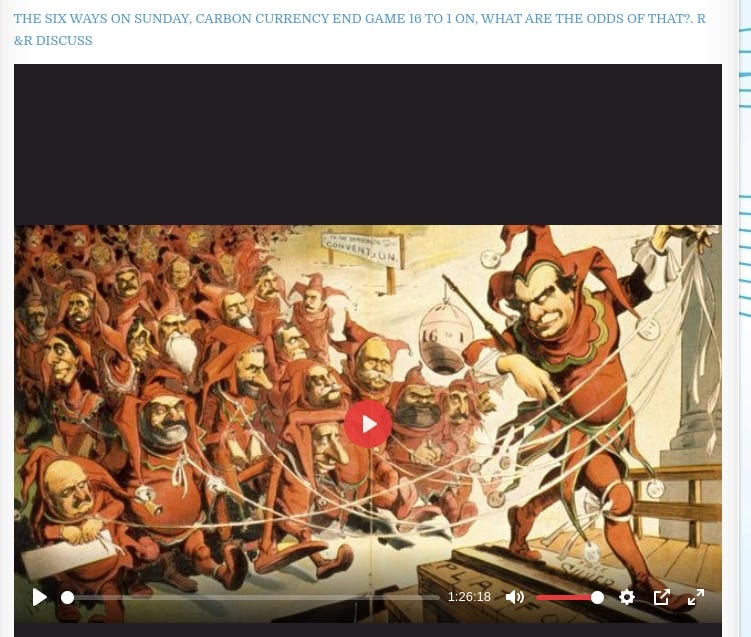A Priori, "The Proof of a Theory is in its reasoning " Ludvig Von Mises. I would propose this title. "Gold Is Money" JP Morgan. Discuss?
Zarlenga Debunks the Praxeological Austrian Cult.@PerBylund @financialeyes
2 Ludwig Von Mises, Theory of Money & Credit, 1912, (Capetown, Jonathan Cape, 1934), pp. 82, 478, and Ch. 7, sect
20 THE FEDERAL RESERVE WRECKED AMERICA 563, Lost Science of Money , Zarlenga.
24 PROPOSALS FOR U.S. MONETARY REFORM 677
2. Poor monetary and economic thought Much inane monetary thinking arises from the Austrian School of Economics, which has more influence in America than in Europe, thanks to its hold on American Libertarians. The monetary positions of this school are weak right from its founder Carl Menger’s theory of the origin of money. Their main monetary tract was written in 1912 by LudwigVon Mises at only age 31. Yet re-printings have almost no changes, despite the momentous monetary events that occurred since then! This reveals a kind of arrogance to beware of. Von Mises’ rarely read bookhas many contradictions and bold unsupported assertions on its key monetary positions, for example his assertion that: “The concept of money as a creature of law and the State is clearly untenable. It is not justified by a single phenomenon of the market.” 16 Why? No answer. That single statement brands him as either dishonest or foolish. It is clear from history that money is a creature of the law and the state. We have documented case histories that prove himwrong, in many of our chapters. The Austrian School - “A leap backward” The method of Von Mises and the Austrians is either a form of shouting as in the above example, or it is theoretical, a’priori reasoning. This use of deduction rather than observation, and their tendency to ignore the scientific method, caused the Austrian School to be labeled “a leap backwards” in economic thought by Edward C. Harwood, founder of the American Institute for Economic Research (AIER) in Great Barrington, Massachusetts: “Dr. Von Mises denies not once but several times that his theories can ever be disproved by facts. This point of view represents a leap backward to Platonic Idealism or one of its offspring in various disguises.” 17 The ongoing work of the AIER should not discard Harwood’s acute observations on this matter.© It should be mentioned that among the Austrian economists, the author truly admires Professor Murray Rothbard’s clear and unequivocal condemnation of fractional reserve banking as a “Ponzi scheme.” Von Mises criticized it less forcefully; but most Austrians support it in the name of free markets. Rothbard understood that free markets stop where fraud and privilege begin. We don’t mean to only single out the Austrians. Similar charges apply to other “schools” as well. As a “science,” economics is very ill.
©The author served as a Trustee and Executive Committee member ofthe American Institute for Economic Research (AIER) in 1976, in a successful effort to help the Institute resolve its problems with the Securities & Exchange Commission.)
References Chapter 24.
10 Ludwig Von Mises, Human Action, (Yale Univ. Press, 1949), pp.560-80.
16 Ludwig Von Mises, Theory ofMoney and Credit, (Capetown: J. Cape, 1 934), p. 69.
*Von Mises, Ludwig. Theory ofMoney & Credit. 1912. Capetown: J.Cape, 1934. * . Human Action. Yale Univ. Press, 1949. . Money; Method and the Market Process. Norwell: Praxeology, 1990.
Index Reference to Von Mises
Theory ofMoney and Credit, The (Von Mises), 4
Von Mises, Ludwig, 4, 568, 670, 676-77; wrongfully attacks Franklin, 4; paper money, 372; usury, 189
THE BASTIAT-PROUDHON DEBATE
ON INTEREST (1849-1850)
LETTER 13
[Letter 12 by Tucker’s numbering]
PROUDHON TO BASTIAT,
11 FEBRUARY 1850
[Translation (as “Under the Scalpel – Bastiat’s Intellect Mercilessly Dissected. – PROUDHON’S LAST LETTER. – An Exhaustive Summary of the Whole Discussion. – LONG EXPOSE OF BASTIAT’S BLUNDERS, – Followed by a Left-Handed Eulogy as a Clincher in Conclusion. – BRILLIANT ENDING OF A FAMOUS CONTROVERSY. – The Defender of Capital Laid in His Grave by the Champion of Labor. – INTEREST AND PRINCIPAL. – LETTER TWELVE. – PROUDHON TO BASTIAT. – [TRANSLATED FOR THE IRISH WORLD BY BENJ. R. TUCKER.]”) by Benjamin R. Tucker, in The Irish World and American Industrial Liberator, 11 October 1879.]
Intellectual Mechanics.
[– These] faculties taken together constitute [REASON].
DOI-IV-13.6The induction of Plato; the syllogism of Aristotle; the contradiction of the Sophists; the identity of Condillac; the antinomy of Kant and Hegel, – are only various forms of reasoning, special applications of logic, just as the use of steam as a motive power has caused the invention of all kinds of machinery, – locomotives, steamboats, stationary engines, high or low pressure engines, etc., – but which are all dependent upon the same principle, – steam.DOI-IV-13.7All the sciences, without exception, are founded [on] logic; that is, on the exercise of the four [basic] faculties, – perception, comparison, memory, judgment. That is why science is essentially demonstrative: spontaneity, intuition, imagination have no scientific authority. [It is] for this reason too, it is by virtue of their reasoning faculties, that men become capable of communicating their thoughts and of conversing with each: deprive them of perception, comparison, memory, and judgment, and [they] speak successively or all at once, but they [do not] answer or understand each other.DOI-IV-13.8[Now] to apply these laws of the human mind, our common criterion.
As for you, Monsieur Bastiat, who, an economist, mock at metaphysics, of which Political Economy is but the concrete expression; who, a member of the Institute, are unacquainted even with the philosophy of your century; who, the author of a work entitled “Economical Harmonies” probably in opposition to my “Economical Contradictions,” [M. Proudhon is mistaken in his conjecture. Bastiat did not write the Harmonies in opposition to Economic Contradictions, since on 5 June 1845, that is to say, prior to the appearance of the Contradictions, he communicated in a letter to a friend his intention to write Social Harmonies. Let us also recall that Bastiat was solely a corresponding member of the Institute. – OC] have no conception of the harmonies of history, and see in progress only a desolating fatalism; who, an advocate of Capital and Interest, are utterly ignorant of the principles of commercial bookkeeping; who, conceiving finally, through the circumlocutions of a bewildered imagination and on the authority of your authors more than from your own profound conviction, that it is possible to organize, with the pubic funds, a bank giving Credit without Interest, continue nevertheless to protest, in the name of Liberty of Credit, against GRATUITY OF CREDIT, – you are undoubtedly a good and worthy citizen, an honest economist, a conscientious writer, a loyal representative, a faithful Republican, a true friend of the people: but your last words entitle me to tell you, Monsieur Bastiat, that, scientifically, YOU ARE A DEAD MAN.
[Ironically, Bastiat would in fact be dead by the end of the year. – RTL]
P. J. PROUDHON.
http://praxeology.net/FB-PJP-DOI.htm
THE BASTIAT-PROUDHON DEBATEON INTEREST (1849-1850)
Translations by Benjamin R. Tucker,
Roderick T. Long, and Anonymous
Click here for the French version
Cliquez ici pour la version française
April 9, 2017
The first part of this so-called debunking of the desert island interest myth caught my eye as did a similar debunking by Steve Keen in Forbes. One of my touchstones of the critical faculties of any Heterodox or Radical ´´Progressive´´these days is to see if they are Sophists for Usury or Sophists for Anthropogenic climate change.Fill in your own No True Scotsman arguments to taste.No true Scotsman
From Wikipedia, the free encyclopedia
For the practice of wearing a kilt without undergarments, see True Scotsman.
No true Scotsman is a kind of informal fallacy in which one attempts to protect a universal generalization from counterexamples by changing the definition in an ad hoc fashion to exclude the counterexample.[1][2] Rather than denying the counterexample or rejecting the original claim, this fallacy modifies the subject of the assertion to exclude the specific case or others like it by rhetoric, without reference to any specific objective rule (“no true Scotsman would do such a thing”; i.e., those who perform that action are not part of our group and thus criticism of that action is not criticism of the group).[3]
http://positivemoney.org/2017/02/interest/
−Roger Glyndwr Lewis • 23 days ago
Bernard Lietaers fable of the 11th round adresses this question, I have wondered why Steve Keen and others seem so keen to pooh pooh this as a naive urban myth.
Usury is the Price of money, it is the metric of Economists, the high priests of Economics Woo.
What we see in Keen and Varafoukis is really at best a controlled opposition clinging to the social control mechanism that is debt based money. They all do it.
Prouhdon scotched the artifice in his dialogue with bastiat, and also as described by Kropotkin.
Story of the 11th Round.
http://www.lietaer.com/2010…
We can learn a lot from the Swiss referendum on Citizens Income as discussed here.
´However, the nearly universal misunderstanding of money is a major obstacle. For too long we’ve allowed a small coterie of bankers and “court economists” to hold the secrets and “tutor” us. So, it’s time for total openness.
First, regarding the claim that the Swiss proposal would’ve been too costly, what’s entirely omitted from the discussion is that the proposal (and similar proposals elsewhere) appear to call for re-distribution of existing money—taking money from certain sectors through taxation and re-allocating it to the people at-large.
The implication is that the money supply is basically static and that re-distributing limited funds would require tough budget decisions—sparking tax hikes and associated spending increases in several areas; hence the claim “costs too much.”
But a successful basic-income plan can and must be based on the creation of new money, or “distributism,” not on reshuffling existing money, which is “re-distributism.” That’s the “state secret” that no one wants to touch.
The issuance of new money needs to happen to overcome the huge “gap” between today’s paltry purchasing power and the massive mountain of debt and the towering totality of prices on all available goods and services. We have full stores and empty wallets. (Ideally and importantly, governments should reclaim their interest-free money-creation rights and forbid private central banks from creating money any longer).´´
http://leconomistamascherat…
This is for me the nub of the matter something I have in common with Joseph Prouhdon, explained by Peter Kropotkin in the Encyclopedia Britannica thus.
https://archive.org/stream/…
”Now Proudhon advocated a society without government, and
used the word Anarchy to describe it. Proudhon repudiated,
as is known, all schemes of Communism, according to which
mankind would be driven into communistic monasteries or
barracks, as also all the schemes of state or state-aided Socialism
which were advocated by Louis Blanc and the Collectivists. When
he proclaimed in his first memoir on property that ” Property
is theft,” he meant only property in its present, Roman-law,
sense of ” right of use and abuse ” ; in property-rights, on the other
hand, understood in the limited sense of possession, he saw the
best protection against the encroachments of the state. At the
same time he did not want violently to dispossess the present
owners of land, dwelling-houses, mines, factories and so on. He
preferred to attain the same end by rendering capital incapable
of earning interest; and this he proposed to obtain by means of
a national bank, based on the mutual confidence of all those who
are engaged in production, who would agree to exchange among
themselves their produces at cost-value, by means of labour
cheques representing the hours of labour required to produce
every given commodity. Under such a system, which Proudhon
described as ” Mutuellisme,” all the exchanges of services would be
strictly equivalent. Besides, such a bank would be enabled to
lend money without interest, levying only something like 1 %,
or even less, for covering the cost of administration. Every one
being thus enabled to borrow the money that would be required
to buy a house, nobody would agree to pay any more a yearly
rent for the use of it. A general ” social liquidation ” would
thus be rendered easy, without violent expropriation. The same
applied to mines, railways, factories and so on. ”
Such is, substantially, Socialism’s theory of Capital and Interest.
DOI-IV-3.52
Not only do we affirm, in accordance with this theory (which, by the way, we hold in common with the economists) and on the strength of our belief in Industrial development, that such is the tendency and the import of lending at Interest; we even prove, by the destructive results of economy as it is, and by a demonstration of the causes of poverty, that this tendency is necessary, and the annihilation of Usury inevitable.
DOI-IV-3.53
In fact, Rent, reward of Capital, Interest on Money, in one word, Usury, constituting, as has been said, an integral part of the price of products, and this Usury not being the same for all, it follows that the price of products, composed as it is of Wages and Interest, cannot be paid by those who have only their Wages, and no Interest to pay it with; so that, by the existence of Usury,
Labor is Condemned to Idleness and Capital to Bankruptcy.
DOI-IV-3.54
This argument, one of that class which mathematicians call the reductio ad absurdum, showing the organic impossibility of lending at Interest, has been repeated a hundred times by Socialism. Why do not the economists notice it?
DOI-IV-3.55
Do you really wish to refute the ideas of Socialism on the question of Interest? Listen, then, to the questions which you must answer: –
DOI-IV-3.56
1. Is it true that, though the loaning of Capital, when viewed objectively, is a service which has its value, and which consequently should be paid for, this loaning, when viewed subjectively, does not involve an actual sacrifice on the part of the Capitalist; and consequently that it does not establish the right to set a price on it?
DOI-IV-3.57
2. Is it true that Usury, to be unobjectionable, must be equal; that the tendency of Society is towards this equalization; so that Usury will be entirely legitimate only when it has become equal for all, – that is, nonexistent?
DOI-IV-3.58
3. Is it true that a National Bank, giving Credit and Discount gratis, is a possible institution?
DOI-IV-3.59
4. Is it true that the effects of the gratuity of Credit and Discount, as well as that of Taxation when simplified and restored to its true form, would be the abolition of Rent of Real Estate, as well as of Interest on Money?
DOI-IV-3.60
5. Is it true that the old system is a contradiction and a mathematical impossibility?
DOI-IV-3.61
6. Is it true that Political Economy, after having, for several thousand years, opposed the view of Usury held by theology, philosophy, and legislation, comes, by the application of its own principles, to the same conclusion?
DOI-IV-3.62
7. Is it true, finally, that Usury has been, as a providential institution, simply an instrument of equality and progress, just as, in the Political sphere, absolute monarchy was an instrument of liberty and progress, and as, in the Judicial sphere, the boiling-water test, the duel, and the rack were, in their turn, instruments of conviction and progress?
DOI-IV-3.63
These are the points that our opponents are bound to examine before charging us with scientific and intellectual weakness; these, Monsieur Bastiat, are the points on which your future arguments must turn, if you wish them to produce a definite result. The question is stated clearly and categorically: permit us to believe that, after having examined it, you will perceive that there is something in the Socialism of the nineteenth century that is beyond the reach of your antiquated Political Economy.
P. J. PROUDHON.
Quite !
https://www.marxists.org/ar…
Steve Keen tried this already in his Forbes article the reality nheld up against Keens own beautiful theory is amply scothced in the comments.
https://www.forbes.com/site…
xegesis Hermeneutics Flux Capacitor of Truthiness
Toggle Sidebar
March 2, 2020
MONEY ITS A GAS, USED TO BE OIL, BUT YOU STILL HAVE YOUR HANDS ON MY STASH. ENERGY ECONOMICS. BANNED FROM SEEDS. #WTF
drtimmorgan on February 15, 2020 at 3:06 pm said:
Just to restate my position on this, the economy is an energy system, in which nothing with any economic utility at all can be produced without energy.
Money has no intrinsic worth, but commands value only as ‘claim’ on the products of the real economy. Its only function is as a medium of exchange.
Fulfilling this function requires that two preconditions are met:
1. There is something for which money can be exchanged
2. The kind of money in question is accepted by all parties as a medium of exchange
Money (in any form) given to someone adrift in a lifeboat has no value, because it fails the first test.
Somebody arriving from Mars with pockets full of Martian Zogs would find his money useless, because it fails the second test.
Therefore, there is no monetary solution to the deterioration in prosperity caused by a fall in the supply of surplus energy.
The authorities do not understand (or, at any rate, admit) this. They are using monetary manipulation to prop up inflated asset prices. The only reason why they haven’t been called on this is that we cannot monetise asset ownership, i.e. sell all stocks, bonds and properties and turn them into cash.
In the future, the use of money manipulation might be extended into, for example:
A. Financing government spending as the revenue base erodes
B. Subsidising fossil fuel production
C. Subsidising investment in renewables
D. Helping the victims of falling prosperity
ANY of these uses would be inflationary, quite possibly to the point at which the credibility of fiat currencies is destroyed.
This means that the only way to achieve objectives A-D without destroying the currency has to involve redistribution.
rogerglewison February 15, 2020 at 3:41 pm said:
Your comment is awaiting moderation.
Redistribution of What to who and by which means?
Energy is Ubiquitous, yet Value is an abstract concept and there are experiential values which exceed their Energy input where an abstract value, such as a monetary unit is allowed to reflect the Market determined price.
The fact is that there are different levels of needs and wants and over an above fundamental survival requirements, Say 2500 Calories a day including embodied energy for Shelter and dietary requirements.
What are the absolute bands of energy requirements, how much energy is Wasted and how much-embodied energy can be re-cycled that is currently wasted all have to factor into any ongoing Energy Based Distribution system and energy-based system for determining and energy-based into of account?
What is the problem with having a different type of Currency, why does Destruction of the existing unfit for purpose system have to be taken as read?
There have been successive efforts since the Nixon shock to replace the current international FInance model, that we are moving to a Multi-Polar world seems an inescapable conclusion, with all the potential problems this represents for the Dollar centric hegemony.
If it ain’t broke don’t fix it is always a good maxim but if a new design is called for to replace an obsolete system then everything is on the table.
I personally reject your four-point example and the inevitability of your conclusion Tim.
The world has tremendous potential as does the industrial capacity and also cultural and technological potentials of current technology. Of course, there are fundamental changes which need to be made The single biggest problem is the mispricing inherent in the financialised late-stage capitalism which has morphed already into Fascism, otherwise known as Neo-Liberalism.
Pierre Joseph Proudhon proposed a reform to banking which was quite simply to abolish the private monopoly on the creation of Currency as debt at interest. Peter Kropotkin describes Prouhdond Simple idea and its effect as follows,
https://boomfinanceandeconomics.wordpress.com/2020/01/18/boom-as-at-19th-january-2020/
Given that Tim has his epilogue at the end of the Financial Jigsaw I would be interested also in your Sit rep on the question of "Peak Oil". Would the above form the basis for a discussion we could record and put up on Youtube and Bitchute? I would be interested to hear what your position is on the different themes set out in any even. Best Rog
We never did have our discussion of my review of your Jigsaw book.
I would still very much like to publish a chat between us.
I would propose this title.
"Gold Is Money" JP Morgan. Discuss
rogerglewison February 16, 2020 at 10:39 am said:
Hi Peter, Austrian Economics has several sub-schools, For instance, Schumpeter and Mises have differences not only of degree but of kind, Also Hayek is accepted by some but not all Austrians? What kind of Austrian are you? Wasn’t Adolph Hitler also Austrian? Yes of course he was, so Schact and Fitcsh should also factor into any debate on Austrian Economics which I contest as a School of Economics is widely misunderstood and misrepresented by those who adoipt it as a Political Stance absent the requirement of evidence as much as other Schools of Thought that morph into dogmatism.
MMT has its factions also, I like Hudson but think Bill Mitchell is a Zealot hiding in Academic Clothes of pretended Objectivity.
https://mises.org/library/mises-and-schumpeter-friendly-rivals
This Narrative on The Schumpeter Mises difference of opinion is I contend polish on an actual turd.
May 20, 2018
STEVE KEEN ON SECTORAL BALANCES MMT AND MONETARY CIRCUIT THEORY MINSKY AND SCHUMPETER.
Roger January 21, 2016 at 5:19 pm #
Steve Keen on Sectoral Balances MMT and Monetary Circuit Theory Minsky and Schumpeter.
Keen draws the important distinction between Post Ante and Ex ante measurement of Aggregate incomes.
My presentation at the UMKC Post Keynesian conference in 2012 where I prove that, given endogenous money, effective demand is income plus the change in debt, and show that this is compatible with sectoral balances.Keens Program minsky is fun to play with. What I would add with this is this is all Economics it is definitely not rocket science, frankly this is all pretty basic stuff the maths is not difficult. Its the Politics and the Ethics that make any of this controversial because they are the motivations behind the economic choices behind monetary policy and the resultant effects on wealth distribution.
http://www.debtdeflation.com/blogs/2012/09/16/fields-institute-mmt-mct-seminar/comment-page-2/
Exegesis Hermeneutics Flux Capacitor of Truthiness
Toggle Sidebar
August 8, 2022
DEBUNKING MONEY, DEBT BASED CARBON CURRENCY END GAME. TIDES OF THE DOLLAR MOON, USURY HELLS FUEL MANS OPPRESSOR, GLOBALISATION UNENTANGLED, MELT FUND, A BOURGEOISE RESOLUTION. A RATIO, A QUOTIENT, A FUNCTION AN ALGORITHM. EVENT 201 WAS A MONETARY EVENT!
Welsh; arian
English; cash; money; silver; wherewithal
YOU SAY #ARYANS I SAY #ARIANS
Are Price and Value the same thing and if not which one is worth more, is worth a measure of Price or a measure of Value, or is worth another name for a measure? How circular is this argument in the lexicon of What’s in it for me?
#DamonVrabel.
STACK OVERFLOW. Stack Exchange.
Ceteris Paribus vs Panta rei
Exegesis Hermeneutics Flux Capacitor of Truthiness
Toggle Sidebar
February 19, 2017
MEET THE FUGGERS, BREXIT, THE EURO AND CLUELESS ELITES.
Meet the Fuggers or, its the Money Power stupid.
Brexit, The Euro and clueless Elites.
The Eastern Roman empire under Justinian saw the seeds of its final fall to The Ottomans when Abd El Melik started paying tribute in Gold coinage under his own Political Branding you might say.
With all the talk of Brexit being the removal of a final obstacle to the deeper federation of a European State transcending tiresome nationalism, perhaps a little review of History, particularly Monetary history, might not be such a bad thing.
INTRODUCING PROFESSOR RICHARD WERNER.
Joseph Schumpeter was good on money and Werner’s thesis quotes extensively from him, ( see below). Werners´ empirical evidence that private banks are making loans without reserves proves that the ECB MONETARY model is the same extractive ´´Bankster´model that has brought penury and poverty to all countries in the EU as it has across the Globalised economy. All countries even the richest ones. Schumpeter is also prescient with respect to the reality of democracy in his competing elites model. The modern model has now reached a kind of stagnation where the Elites seem now to dispense with the necessity to compete. Schumpeter’s other peculiar Genius was in identifying what democracy really means in the Modern form of Elitist Technocratic Government as represented By The EU and its Institutions. I refer of course to Schumpeter’s Competing Elites model of democracy.
To remain with Money, for now, not just the Euro and Stirling but all money falling under the auspices of the IMF, World Bank and International Bank of Settlements.
Here is Steve Keen, the very sharp professor of heterodox monetary theory tackling this question and Joseph Stiglitz in this Entertaining and educational article.
Note To Joe Stiglitz: Banks Originate, Not Intermediate, And That’s Why Aggregate Demand Is Stuffed
This is my Comment posted against the same article, providing the proof for Professor Keen´s assertions from Professor Richard Werner, Who I promised to introduce you to.
” Money created by banks when they make loans so says Ben Bernake on Live TV clip at 14.58 min
Richard Werner @ProfessorWerner First empirical test in 5000 years of banking on whether each individual bank can create money out of nothing is out
http://ac.els-cdn.com/S1057521914001070/1-s2.0-S1057521914001070-main.pdf?_tid=781b835e-8880-11e4-8cf9-00000aacb35f&acdnat=1419104788_bcaee65302916a2bab37a5cf7f63c992 …
https://positivemoney.org/2014/03/bank-england-money-money-creation-modern-economy/
If you skipped the links and took me at my word here’s a bit more of Schumpeter to tee up our shot.
“Something like a certificate of future output or the award of purchasing power on the basis of promises of the entrepreneur actually exists. That is the service that the banker performs for the entrepreneur and to obtain which the entrepreneur approaches the banker. … (The banker) would not be an intermediary, but manufacturer of credit, i.e. he would create himself the purchasing power that he lends to the entrepreneur …. One could say, without committing a major sin, that the banker creates money.” 14
Schumpeter (1912, p. 197, emphasis in original)“[C]redit is essentially the creation of purchasing power for the purpose of transferring it to the entrepreneur, but not simply the transfer of existing purchasing power. … By credit, entrepreneurs are given access to the social stream of goods before they have acquired the normal claim to it. And this function constitutes the keystone of the modern credit structure.”
Schumpeter (1954, p. 107)
And finally Professor Werner in his own words.
´´Among the many different monetary system designs tried over the past 5000 years, very few have met the requirement for a fair, effective, accountable, stable, sustainable and democratic creation and allocation of money. The view of the author, based on more than twenty-three years of research on this topic, is that it is the safest bet to ensure that the awesome power to create money is returned directly to those to whom it belongs: ordinary people, not technocrats. This can be ensured by the introduction of a network of small, not-for-profit local banks across the nation. Most countries do not currently possess such a system. However, it is at the heart of the successful German economic performance in the past 200 years. It is the very Raiffeisen, Volksbank or Sparkasse banks – the smaller the better – that were helpful in the implementation of this empirical study that should serve as the role model for future policies concerning our monetary system. In addition, one can complement such local public bank money with money issued by local authorities that is accepted to pay local taxes, namely a local public money that has not come about by creating debt, but that is created for services rendered to local authorities or the community. Both forms of local money creation together would create a decentralised and more accountable monetary system that should perform better (based on the empirical evidence from Germany) than the unholy alliance of central banks and big banks, which have done much to create unsustainable asset bubbles and banking crises (Werner, 2013a and Werner, 2013b).
Professor Werner is the Author of the wonderful book Princes of the Yen which is also the title of a Film of the same title. It shows how the forces of neo-liberalism and dollar hegemony were used through the Federal reserve to Liberalise and ruin the Japanese economy pulling down what it had created.
Of course the WTO, IMF and International Bank of settlements all figure in our story and the Private Federal reserve is a key player in the 2008 financial Crisis, Ben Bernake being in the front seat of this speech given by Jean Claude Trichet. In 2012
‘Democracy is that institutional arrangement for arriving at political
decisions in which individuals acquire the power to decide by means of a
competitive struggle for the people’s vote’.”
Joseph Schumpeter, Capitalism Socialism and Democracy 1943
Quoted
from Roy Madron, Super Competent Democracies who in turn Cites.
“Participation, and Democratic Theory” by Carole Pateman. Dr Pateman
says that, Schumpeter and his followers: … set the current
Anglo-American political system as our democratic ideal (with) a
‘democratic theory’ that in many respects bears a strange resemblance to
the anti-democratic arguments of the last (i.e. 19th) century. No
longer is democratic theory centred on the participation of ‘the
people’; in the contemporary theory of democracy it is the participation
of the minority elite that is crucial and the non-participation of
the apathetic, ordinary man lacking in the feelings of political efficacy,
that is regarded as the main bulwark against
instability.
´´ http://letthemconfectsweeterlies.blogspot.se/2015/03/on-may-2015-re-election.
Heres the Forbes List of the most powerful people in the world 2009 edition http://www.forbes.com/2009/11/11/worlds-most-powerful-leadership-power-09-people_land.html.
Where is the throne of ELITE POWER? I would argue it is where it has always been in the Counting houses, in the Banks and exchequers. Some study of Steve Keen’s work on advanced financialised Capitalism bears close examination and his work on endogenous money creation, David Graeber’s Debt the first 5000 years serves as a useful historical context against which Keen’s work can be considered, search Marx´s roaming cavaliers of Capital to get some of Keens cutting analysis of Financialised Capitalism and its cannibalistic nature described by Marx so aptly. http://www.debtdeflation.com/blogs/2009/01/31/therovingcavaliersofcredit/
“Talk about centralisation! The credit system, which has its focus in the so-called national banks and the big money-lenders and usurers surrounding them, constitutes enormous centralisation, and gives this class of parasites the fabulous power, not only to periodically despoil industrial capitalists, but also to interfere in actual production in a most dangerous manner— and this gang knows nothing about production and has nothing to do with it.” –
See more at:
http://www.debtdeflation.com/blogs/2009/01/31/therovingcavaliersofcredit/#sthash.d4gs1dAX.dpuf
Marx, Capital Volume III, Chapter 33, The medium of circulation in the credit system, pp. 544–45 [Progress Press] – See more at:
January 6, 2016
THE IRON LAW OF OLIGARCHY.
I posted a comment at Truth Dig which I decided to write as a Blog post as well just to bring together some of my Reading on Elites and Oligarchy. Chris Hedges article is here.
The Manifesto of the Trilateral World Fascist Party.
There is a March 2024 Obituary with the same name as Michael, as his work is pretty much in the room 101 section of the panopticon jailer bot in the custody of Winston Smith it is not possible to triangulate whether or not this important researcher and defender of Liberty has in fact passed away, without fanfare,
What is the Purpose of the Economy MARCH 16, 2023
What is the Purpose of the Economy? #ArtificialScarcity #TaxFarming #FinanceTailWagsCommunityDog #WagTheDog #Stupidlosophy to #CanofWorms #Aadhaar # ROGERGLEWIS MARCH 16, 2023 3 COMMENTS
February 25, 2016
USURY HELLS FUEL AND MANS OPPRESSOR.
Premiere Reading
COUNSEL FOR THE PEOPLE CHARGE USURY OF ITS CRIMES.
This baron abstract that claims fruit.
This heavy invisible burden,
a yoke. Fashioned in language,
felt but never seen.
inflicting scars as deep as any lash,
claiming lives as real as any canon.
This nightmare device of imagination.
Who are the slayers of this mythical dragon?
Coleridge saw beauty in nature where sweet amaranths bloom. And Shakespeare compared his summers day.
What of this hamlets ghost of a spectre?
something is rotten in the danegeld,
many more promises are written than can be kept.
So much nectar strained from thin broth,
which bargains can be made?
When the music stops and the dancers
sit down. Chairs are our metaphor for the real.
Always too few.
Rascals become clothed in robes
and honesty is reduced to rags.
Elisabeth lease had a purchase on truth.
”When people starve how can overproduction stand charged. It is money promises, kept short in supply that causes starvation. The consumption in the lungs of the community, is the usurers confection.
A counterfeit Nobel laureate, theres an irony.
Denies that in money there can be a place that gertrude stein called there, home once but no longer there , there in Oakland. A precursor to some sub prime heritage.
A speaker of truth to power could follow Pauli ´Das ist nicht nur nicht richtig, es is nicht einmal falsh!
Not even wrong, not even there.
All counterfeit, yet to counterfeit the counterfeit? a crime.
What of the shepherd of this unruly nothing,
where will they pen and fence this pack of wolves.
Will they dress this pack of cards in sheep’s clothing.
Limit the herd a need for Golden standards.
Prudence of sound Money and even sounder usury.
Fix the price and patronise those who will honour the thievery. A mechanism to harmonise silent ballot boxes.
A gentlemen from belgium would complement his single currency. Unruled and unruly sets a course for austerity on a continent many times at war. A fight of 11 rounds.
Spread like a cancer through the development of continents, enabling the killing called wars. That increase the debt and centralise the money power.
Quiggly shewed the tragedy, little hope it seemed,
blind faith in capitalisms harlot. That babylonian whore.
At first a mere money trick for ragged trousered philanthropy. With usury, take away whats not even yet been paid. Ruskin would see wealth as that which is valuable in the hands of the valiant. Real goods sustain and wealth succours. Usurious money is but an unmade claim and worse. No banker has earned that newly minted note that hangs discordant in the air, as apt to rob as to pay.
How obscure this obscurant cult of mammon.
What smoke screened hall of mirrors.
How obese and gluttonous the leviathan of usury.
Austerity for the likes of you and I.
More banqueting and evacuated vomit spews from the sceptred top table. Corrupt in patronage and jealousy of power. Overstuffed with greed and thirsty for more.
How mean the jealousy of greed grows.
As more wants more and demands all.
The truly poor are those who desire much,
oppressive wealth no longer is, it only has.
Usury consumes the usurer, no self just an exponential nothing. Growing ever more grotesque in a shadow of what never was and never could be.
A doom laden ring of the nibelungs slained by teutonic nobles and routed by heroic Norsemen.
The paper money shrouds the rock of prometheus and
still he forgets in whose promises the usurers truck.
A Semiotic Turn Wenzels genuinely fake.
A language of abstract form commemorates brotherhood.
Van Meegrans supper at Emmaus implies Vermeer’s intention for experts to divine. A counterfeit of that which never had been, claimed as real and must be from the brush of the master. A looting tyranny coveting the genuine fakery like so much gold pulled from the mouths of corpses. Like so many rabbits out of so many hats and the goldfish does not know the water it swims in until the surface is broken.
The beauty of dying lilies, the artist petrifies the fleeting moment and time is solidified.A promise solidified in time measured in life and non existence. Celebrate Les miserables of L’Argent . Hugo, Zola and Proudhon scream.
A promise wrapped up in a lie claiming existence where no air remains to breathe or, food to sustain. Asking everything for giving nothing. A mountebank by nature, a swindle made official by the state. To enslave the masses and keep them in want.
CONCLUDING PRAYER.
A central lack of fibre. Either moral or physical around which myths of debt are spun. As spiders spin webs and weavers warp clothe. Spartan Ephors of prudence pass judgement on all and stand above and astride the law. Dispensing injustice and taking clothes off the backs of The freezing and food out of the mouths of the hungry. Passing judgement on those who perform real work, asking always for more and demanding to pay less.
So draw the bow of truth with intentness in the eye,
Seek out the irreducible posits, the epistemological gods of homer. If there be one free miracle let the ephors explain the rest. What is this power of usury? Where did this power come from ? Who is it exercised for and to whom do you ephors of usury answer to ? And now let me ask. How do we take this power away? Only then we shall see good faith and brotherhood restored to the commons.
©RogerG Lewis 2016
The Conquest Of Dough (Going Direct Spring 2024) Kindle Edition
by Roger Lewis (Author) Format: Kindle Edition
Collects books from: Going Direct Spring 2024
See all formats and editions
The Conquest of Dough is a metaphorical parable about sourdough bread and a legendary Syrian Sourdough that is smuggled out of Aleppo. The challenges and reflections of the guardians of the dough's esoteric mysteries, and why the dark-hearted breed of men who seek to destroy it are all tackled. Dough is the metaphor for Money which examines another of my areas of work, Monetary reform activism. The Finale of Conquest of Dough is a hilarious Romp through the social aspects of attitudes prevalent in the class from which one of the main protagonists Bunto comes from. In correspondence and reportage Bunto can be seen parodying himself whilst pretending his legend remains what it once was.
The Novel closes with parts 2 and 3 of the epic poem trilogy started in 2016 with Usury hells fuel man's oppressor, Conquest of Dough is the completion of The Trilogy in 4 parts. The trilogy goes around and into themes of democracy, political economy, and social manners and morals. Most of All, Dough, Bread, Dosh, Arians, Gelt, Lucre Money, Credit Currency, Usury and power. What is it ? and how is it done? there are various political episodes in my lifetime I wish to satirise in poetry. Epic Poetry is my preferred medium for satirising matters of Political Economy.
Ebook124 pages1 hour
The Conquest of Dough: The Going Direct Paradigm Spring 2024, #1
By Roger Lewis
Rating: 0 out of 5 stars
(0 ratings)
About this ebook
My essay "Why are we here?" is a thought-provoking exploration prompted by David Malone's documentary series,of the same name. The essay delves into the four films in the series, namely "Meaning Seeking Beings," "The Reality of Ideas," "The Animal Within," and "The Moral Compass." It also delves into the complexities of existence, the pursuit of knowledge, and the interplay between science, philosophy, and ethics.
Sometimes one can not but reflect on the fundamental question of human existence and the quest for meaning. We must express a genuine curiosity about the purpose of life and the nature of our existence. It is unavoidable to also touch upon the limitations of human understanding and the vastness of the unknown, forcing one into acknowledging that universals escape our imagination and perception.
The interplay between science and philosophy poses questions of whether the scientific method or art is more effective in communicating the essence of the unknown or immeasurable. If one contemplates the coexistence of materialism and idealism, it can be helpful to reject the notion that they are mutually exclusive and advocate for a broader perspective that transcends traditional dichotomies.
Ethical considerations in both scientific and religious inquiries highlight the importance of ethical frameworks in shaping human behavior and decision-making, emphasizing the pursuit of virtue for the general well-being of society.
The role of tradition and authority in shaping knowledge systems draws on historical and philosophical perspectives to underscore the complex interplay between tradition, belief, and inquiry. philosophical thinkers, such as Michel Foucault, Neal Donald Walsh, and C.S. Pierce, enrich our arguments and provide a comprehensive examination of epistemological and ethical considerations.
The impact of urbanization on evolution and ecosystem function, linking scientific inquiry to broader societal implications underscores the need for humility and context in scientific education. Recent elite hubris should serve as a caution against propagandistic approaches in both science and religion.
A pause for profound reflection on the complexities of human existence, the pursuit of knowledge, and the ethical considerations can underpin both scientific and religious inquiries. I would encourage readers to embrace a holistic perspective that transcends traditional boundaries, fostering a deeper understanding of the interconnectedness between science, philosophy, ethics, and human experience.
https://www.barnesandnoble.com/w/the-conquest-of-dough-roger-lewis/1145041443
http://conquestofdough.weebly.com/
“Bread Conquered: A Hilarious Journey Through Kropotkin’s ‘The Conquest of Bread’”
·
2 min read
·
Mar 23, 2024
2
So, there’s this dude named Peter Kropotkin, right? He’s like the OG anarchist, always thinking outside the box and challenging the status quo. His vibe is all about freedom, equality, and, of course, bread. Yes, you heard that right, bread. But not just any bread, we’re talking about the bread of liberation here.
Kropotkin looks around and he’s like, “Yo, why are we all stressing about scarcity when there’s plenty to go around?” He’s all about smashing the idea of hoarding and scarcity and spreading the love. Imagine him as the chill skater dude at the park, sharing his snacks with everyone and preaching the gospel of abundance.
In “The Conquest of Bread,” Kropotkin’s dropping some serious truth bombs about how messed up the whole system of ownership and capitalism is. He’s like, “Why should a few fat cats have all the dough while the rest of us are left scraping for crumbs?” It’s like he’s calling out the 1% and telling them to share the wealth, or else.
But Kropotkin isn’t just complaining, nah, he’s laying out a whole new vision for society. He’s talking about this dope concept called mutual aid, where everyone’s looking out for each other and pooling their resources. It’s like he’s setting up this radical potluck where everyone brings something to the table and nobody goes hungry.
And he’s not just talking about food, either. Kropotkin’s all about spreading the wealth in every aspect of life. He’s talking about free education, free healthcare, free everything. It’s like he’s building this dream world where everyone’s living their best life without worrying about bills or bosses.
But Kropotkin’s not naive. He knows that building this new world won’t be easy. He’s all about that direct action, encouraging people to take matters into their own hands and start building the future they want to see. It’s like he’s passing out blueprints for a DIY revolution, and he’s inviting everyone to pick up a hammer and join in.
So yeah, “The Conquest of Bread” is like the ultimate manifesto for anyone who’s tired of being hungry and ready to feast on freedom. It’s like Kropotkin’s throwing a massive potluck party and everyone’s invited, as long as you bring your appetite for change. So grab a slice of liberation and let’s get this revolution baking! 🍞✊
Roger January 21, 2016 at 8:04 pm #
Just to wrap up this line of reasoning and to propose a more realistic treatment of the economy I would venture the Fast Fourier Transform which is used in this example to demonstrate Time domain and frequency domain components in a Sound Signal.
An economy is clearly not a linear phenomena and neither is Sound when one wishes to model subtleties such as Timbre in a sound one finds that Timbre actually lives in the frequency and not the time domain the FFT allows one to relate the two although there are trade offs in accuracy in technical modeling questions such as windowing for that I am linking to a second video entitled why precision matters.
This should open at 3.49 mins and describes the FFT and its real and imaginary components
Now with respect to Precision here is my Friend Katta with her incredible explaination of a very deep concept.
Anyway economic modelling is really no different to Sound or climate modelling the maths , geometries, complexities and dynamics all use the same mathematical and computing tools.
This is here as a note to self as much as anything when I collate all the information gathered here which will probably find its way into a blog post.
My practice in participating in on line discussions is to use them as a sort of seminar to gather together reading from diverse areas of interest and that leads to not begrudging any amount of time it takes to read posts watch links and re read posts.
I never expect anyone to read my own posts or indeed t read my poems , listen to mysongs or music . I think out loud in writing effectively occasionally some pennies drop for me sometimes not.
“Never forget that justice is what love looks like in public”
― Cornel West
I would venture that Economists tend to trivialize the subtleties required in the application of these tools in their rush to reduce the economy which is embedded into society and social relations into Economic variables which they also forget are driven by their own policy inputs.
“QUOD ERAT DEMONSTRANDUM”, DOUBLING BACK TO MAKE SENSE OF THE DOUBLING DOWN, DOUBLE SPEAK AND DOUBLE PLUS GOOD, BEWARE THOUGHT CRIME AHEAD!
This famous cartoon shows The Golden Tail ( Store of Value) wagging the Silver ( Means of Exchange Dog ) it is from 1896


